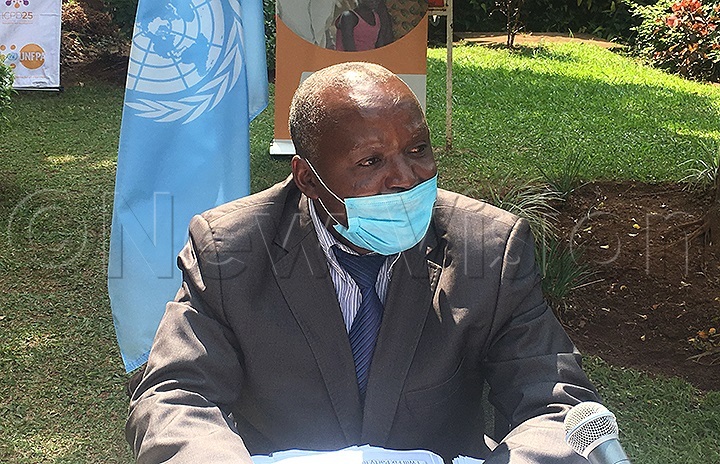COVID-19: Child marriages, FGM on a rise
The State of the World Population Report 2020, estimates that 4 million girls worldwide will undergo FGM or cutting of genitals this year alone, while each year 33,000 teenage girls are forced into marriage.
CHILD MARRIAGE FGM
The World Population Report 2020 reveals child marriages and Female Genital Mutilation (FGM) remain high and are bound to rise as the world faces an unprecedented health crisis due to coronavirus.
The State of the World Population Report 2020, estimates that 4 million girls worldwide will undergo FGM or cutting of genitals this year alone, while each year 33,000 teenage girls are forced into marriage.
In Uganda, child marriage (which affects girls under 18) is high. "The figure was at 49 percent in the past and remains high, while FGM national prevalence is low at below 0.1 percent, but in the three districts of Kapchorwa, Bukwo and Kween incidence are very high," says United Nations Population Fund (UNFPA) representative in Uganda, Alain Sibenaler.
Among the Pokot in Uganda, FGM prevalence is at 80 percent to 90 percent, while among the Tepeth tribe in Moroto FGM is also very high, and incidence of FGM is equally high in Amudat district.
"Our concern is that the practice remains too high," says Alain Sibenaler. He launched the State of the World Population Report 2020 at the UNFPA office in Kampala, to coincide with International Youth Day to re-echo the need to respect girls and women's fundamental rights and emphasize that they must be protected.
In Uganda, the prohibition of Female Genital Mutilation (FGM) Act 2010, is ten years old.
"It is one of the smallest acts, about eight pages, but many people do not know about it," says Charles Zirarema, Director planning at National Population Council.

"We need to keep bringing FGM to the forefront of every policy discussion. Now that we are going into election campaigns when the 11th parliament comes in, they must be engaged and reminded of this Act when they are still fresh. It will help protect our young girls," he says.
Child marriage
It has been worse during these COVID-19 times. You will be surprised by the number of girls being married off during this time, says Zirarema
He gives the recent example of the12 year's old girl, married off to a 52 years old man by her mother for sh50, 000 in Iganga district in Eastern Uganda. Both mother and the religious leader who presided over the marriage were arrested.
"It is prohibited in the constitution of Uganda to marry someone who is below 18 years, but many people continue ignoring the law, and not implementing it, even the law against FGM," says Zirarema
"We should keep advocating for the implementation of the law plus enforcement. There is a lot of laxities when it comes to enforcement," he notes.
He says there are cases of parents colluding with law enforcers to get money from culprits and setting them free. Zirarema says for a girl to be given away for as little as sh50, 000 shows there are a lot of poverty-driven illegalities.
Finding a solution
"We need to continue drawing attention to child marriage and FGM which puts girls and young women at risk of getting denied their fundamental rights," says Sibenaler.
"COVID-19 has worsened all these issues including teenage pregnancies," he states.
Since March there has been more maternal death due to COVID-19, more young women, girls, boys and men are failing to access contraceptives.
In Uganda, some 6,000 women and adolescent girls still die every year from preventable causes related to pregnancy and childbirth, according to the 2016 Uganda Health and Demographic Survey.
According to Sibenaler, the lives of young girls and women is at risk due to lack of communication, transport to move from one point to another to access modern contraception. There is also lack of information and counselling.
In addition, access to antenatal care, and good post maternal health services to deliver a baby safely have also been limited.
The lack of means to generate income for survival due to COVID-19 has left families struggling to make ends meet and take care of basic health care needs including reproductive health, and has also escalated cases of Gender-Based Violence (GBV).
"We need to intensify the message that GBV is not acceptable and it is illegal. We have an Act against FGM, and the constitution prohibits early marriage. Violence against women is a criminal offence," says Sibenaler.
He says with or without COVID-19 the fundamental rights of girls and women should not be forgotten, instead, the government must fulfil its international obligation under international treaties to protect these rights.
In addition, the FGM Act 2010 must be fully implemented to end impunity and ensure access to justice for the survivors or victims of FGM.
But importantly according to Sibenaler, ending violence against girls all starts by keeping children in school especially the girl child so that they are shielded from child marriage, FGM, and their rights are protected.
According to a 2017 World Bank and the International Center for Research on Women study, ending child marriage could add over $4 trillion to the global economy, curb population growth and transform lives of millions of young girls.
In Uganda, by reducing the annual rate of population growth, ending child marriage and associated childbirth, could lead to welfare benefits for Uganda of about $2.4 billion by 2030, says the World Bank.
Also, as a result of low population growth, ending child marriage and early childbearing could result in education budget saving for government of up to $257 million by 2030.